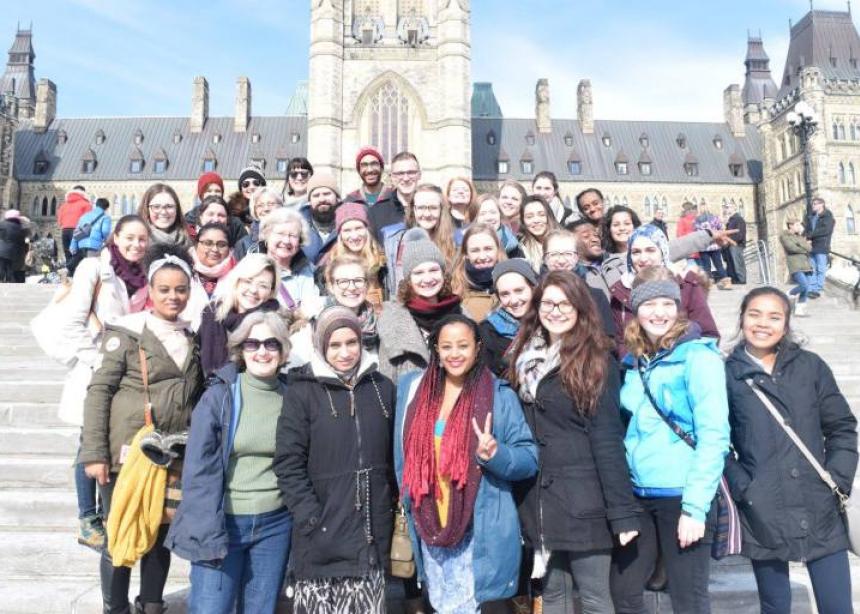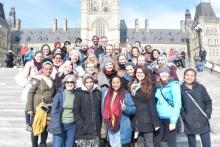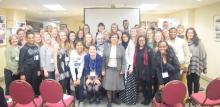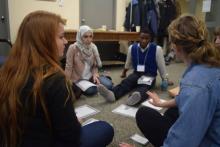We had gathered in Ottawa—eight MCC staff, along with 30 students and young adults from across the country—for our annual MCC Canada student seminar. The topic of the seminar was Gender, peace and conflict: Exploring the intersection.
One of our guest speakers was Senator Mobina Jaffer. Jaffer has been active in promoting the women, peace and security agenda for many years, and she spoke about that work for several minutes. Then she asked permission to go “off topic.” She wanted to discuss what was really on her heart.
And what was on her heart was the reality of being a Muslim in Canada today. Jaffer is herself Muslim—the first Muslim senator in Canada. She spoke about the growing reality of Islamophobia in Canada and about her fears for the future.
Her words were influenced by the recent massacre of Muslims at prayer at a mosque in Quebec City, the increase of messages of hatred directed towards Muslims and others online, and the reaction to Liberal MP Iqra Khalid’s motion against Islamophobia in the House of Commons. As a result of the motion, Khalid has received thousands of harassing and hateful emails, even including death threats.
Political developments in the U.S. and the impact on Muslims is also affecting Canada. Muslim asylum seekers from the U.S. are increasingly crossing the border into Canada at points other than official border crossings so as to avoid being returned to the U.S. through the Safe Third Country Agreement. Some Canadians are sounding the alarm about the potential threat these individuals pose.
“We are having a real crisis here in Canada,” Senator Jaffer said. “The conflict is at our door.”
Nevertheless, she urged the students to be ambassadors of peace and goodwill and to resist the stereotypes which paint all Muslims as terrorists and a threat to society. “Take time to get to know your Muslim neighbours,” she urged. “Be curious about them. Ask them questions.”
Above all, she said, “Reach out. Ask your Muslim neighbours, ‘How can I stand with you?’”
Jaffer’s plea for friendship and solidarity was a poignant interruption in the well-laid plans of the seminar. At the conclusion of her speech, participants paused to take a group photo and a few individuals spoke with her one on one. Then the seminar continued with its planned agenda.
But the “interruption” returned at the conclusion of the seminar, when two of the participants shared their personal stories. Both are Muslims who arrived in Canada as refugees. Both felt emboldened to speak because of Jaffer’s words.
One young woman from Syria told how, as a result of the war in her country, she had lost her dream of becoming an engineer. After one year in Canada, she is beginning to believe the dream might become a reality. She reminded the group of the saying, “I am because you are.” In other words, our lives as humans are intimately intertwined.
The other young woman, a Palestinian from Iraq, dreams of becoming a neurosurgeon. She urged her fellow students not to accept life as it is, but to commit to changing it for the good. “You can make a difference in the world!” she insisted. She expressed her deep gratitude for the Mennonite congregation that sponsored her and her family’s resettlement in Canada and for the friendship experienced at the seminar.
MCC has long been committed to building bridges of friendship with Muslims in Canada and around the world. Interfaith dialogue and bridge-building is, in fact, a key way that MCC and its partners around the world seek to build peace where there is hostility, and friendship where there is fear.
The planners hadn’t identified interfaith friendship and peacebuilding as one of the intended outcomes of the student seminar. But, thanks to a senator’s heartfelt plea, that’s precisely what happened.





Add new comment
Canadian Mennonite invites comments and encourages constructive discussion about our content. Actual full names (first and last) are required. Comments are moderated and may be edited. They will not appear online until approved and will be posted during business hours. Some comments may be reproduced in print.